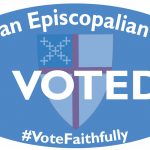Photo above by Caleb Woods, via Unsplash
Rev. Elizabeth Ewing is Rector at Christ Church in Binghamton and a member of the Stewardship Committee
The right to vote is precious and almost sacred, and one of the most important blessings of our democracy. Today we must be vigilant in protecting that blessing.
– Congressman John Lewis
Democracy is a gift we are called to steward if we wish to keep it. Having sworn to support and defend the U.S. Constitution and risked my life in various countries to do so, the sacred blessing of a government by and for the people is dear to my heart as is the right and duty to vote. It seemed fitting to reflect on the stewardship of citizenship on the day of Congressman John Lewis’s funeral.
When the United States began, white land-owning men had the vote as long as they were not Catholic, Jewish or Quaker. By 1856 the requirement to own property ended in all states. By 1870, passage of the fifteenth amendment ensured that black men had the right to vote, though its free exercise was steadily restricted. Women throughout the country could vote as of 1920, Native Americans in 1924 and residents of the District of Columbia by 1961. Sadly, many nonwhite voters faced obstacles to have their voice count at the polls, and this, again sadly, is true to this day.
Democracy asks much of us. Not the least of these demands is a requirement that we serve as good stewards of our citizenship in this country. The right to vote is one of these requirements. It comes with the duty to:
— stay informed through a variety of sound sources. News sources each have a bias, some much more than others. This means a responsible voter seeks sources representing different points of view reviewed by an editor or fact checker. Seeking out public records of or attending public meetings in one’s community is another excellent source.
— vote and make voting possible. First and foremost, register to vote, find your polling place or request an absentee ballot and vote. Once you have done so, encourage others to vote among your friends and family and the broader community. Seek to lower or remove hindrances to voting which discourage poorer, nonwhite and younger voters especially. Get the information out. This year urging people to vote by mail will help ease fears of the coronavirus health risk to voting in person.
— keep elected officials accountable with your vote on election day and by raising your voice in the non election season. We citizens watch over our own officials reminding them they are to work for the good of the American people, to listen thoughtfully to us, and to make principled compromises when needed to advance the common good. The government is not separate from us but rather is us much in the same way our neighbor is not separate from us but is us.
— exemplify values we wish to see in our leaders. While holding government officials accountable, may we all live with justice, integrity, trust and generous hearts.*
We are blessed with a beautiful democratic system of government with three branches providing a system of checks and balances. Perhaps you did not swear to support and defend the Constitution as I did; still it is the duty and responsibility of each one of us to steward and guard this sacred blessing of government of the people, by the people for the people.**
*with thanks to Richard Rohr daily reflection
** with thanks to Abraham Lincoln, “The Gettysburg Address”


I always vote. I enjoyed the reading thanks.